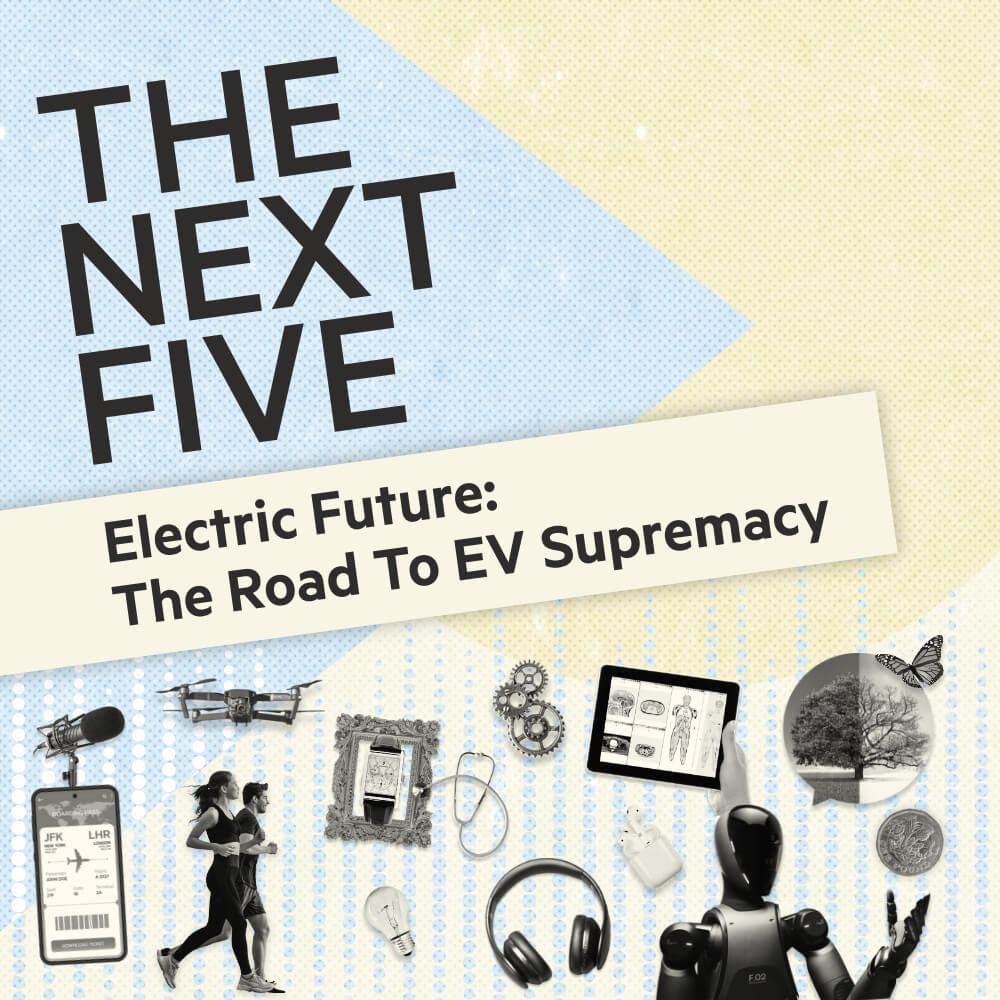THE NEXT FIVE
THE NEXT FIVE - EPISODE 33
The Treasurers' Toolbox: How CFOs Are Preparing For The Future
How are CFOs tackling today's climate while preparing for tomorrow?






































The Next Five is the FT’s partner-supported podcast, exploring the future of industries through expert insights and thought-provoking discussions with host, Tom Parker. Each episode brings together leading voices to analyse the trends, innovations, challenges and opportunities shaping the next five years in business, geo politics, technology, health and lifestyle.
















Featured in this episode:
Tom Parker
Executive Producer & Presenter
Kwee Juan Han
Group Executive and Group Head of Institutional Banking, DBS
Marie Myers
CFO, Hewlett Packard Enterprise
Andre Khor
Group CFO & Deputy CEO, Aster, part of the Chandra Asri Group
Modern finance leaders have had to navigate turbulent waters over the last five to 10 years, buffeted by waves of geopolitical and macro market forces, rising economic nationalism, trade protectionism and environmental instability.
Add that to the unprecedented pace of technological change, shifting consumer behaviours and a reimagined workforce. Here to give us insight on how CFOs are dealing with today's tough climate while preparing for the future is Kwee Juan Han, Group Executive and Group Head of Institutional Banking at DBS, Marie Myers, CFO at Hewlett Packard Enterprise and Andre Khor, Group CFO & Deputy CEO at Aster, part of the Chandri Asri Group.
Sources: FT Resources, Deloitte, Forbes, Protiviti
This content is paid for by DBS and is produced in partnership with the Financial Times' Commercial Department.
READ TRANSCRIPT
- Finance
Transcript
The Treasurers' Toolbox: How CFOs Are Preparing For The Future
Kwee Juan: I'm a firm believer that blockchain will revolutionize the financial market infrastructure
Marie: In terms of what I'm focused on, number one, number two, number three is AI.
Andre: In this situation of a lot of broader macro and geopolitical actors, it is important for us to keep our assets safe physically and digitally.
Tom: Hello, I'm Tom Parker, and welcome to the next five podcast brought to you by the FT partner studio. In this series, we ask industry experts about how their world will change in the next five years, and the impact it will have on our day to day. In this episode we look at the market forces affecting CFOs, as well as the tools in the treasurers toolbox that are helping modern finance leaders to predict, prepare and execute effective growth strategies in a disrupted global economy.
Modern finance leaders have had to navigate turbulent waters over the last five to 10 years, buffeted by waves of geopolitical and macro market forces, rising economic nationalism, trade protectionism and environmental instability. Add that to the unprecedented pace of technological change, shifting consumer behaviours and a reimagined workforce.
Kwee Juan: Recently we just completed a survey of CFO and treasurers, some 800 of them globally.
Tom: This is Kwee Juan Han, Group Head of Institutional banking at DBS
Kwee Juan: And it's surprising to read that many of them are pointing out to the fact that they're going back to basics. As you know, post-liberation day, the market has been somewhat in a turmoil from multiple fronts. One is the CFOs are saying that the FX volatility has gone up a lot, especially in Asia. And you would have seen the Asian currency strengthening against the US dollars.
And many of the treasurers are looking at that and saying, what do I do? And how do I manage that risk? And of course, many of them have gone on to put on the hedges that allows them to manage the volatility on Asian currencies against the US dollars. The second thing that we saw is the fact that this movement in supply chain that they're trying to manage results in the CFO deciding that they have to then think harder around capital allocation, both short-term and long-term. Because on the short-term, it is about creating the working capital that are needed for the flows that are managing for their supply chain. On the longer term, it makes them think, where do I have to put my capital? Because this change in supply chain, this intentional supply chain that they have to set up as a result of the tariffs that are coming off in the US, results in many of them saying, I may have to change my production, looking at perhaps a local for local strategy, meaning build capacity for a local market or region that they are going to sell into rather than to use a global supply chain methodology to address that opportunity. And thirdly, the entire remodeling of supply chain has also resulted in the companies talking about how do I now help my customers who are affected by the way they flow their production. it's no longer about just in time kind of supply chain, but rather an intentional supply chain and ecosystem that have to be set up to deal with the current volatility that they're seeing out there, of rates, liquidity, and as well as goods, et cetera.
Tom: So day to day how are CFOs dealing with these macro pressures?
Marie: Look, I any CFO today of a large company is probably going to tell you that they've never seen such a turbulent time.
Tom: This is Marie Myers, CFO of Hewlett Packard Enterprise
Marie: So Tom, HP is a technology company that's in a fairly broad sphere of the market. actually do everything from support AI servers installation through to storage and networking. we're sort of core. Think about us as being core to your data center. Everything that you typically see in the data center is what we do and provide. And I'd say we're probably the right hand of a CIO for many companies out there today.
I think we all thought COVID was way behind us, but we were not prepared for this new chapter that we're in. And today, mean, it's everything from dealing with tariffs, which tend to change on a fairly regular basis, through to just the changing geopolitical environment that we're in. So as a result of that, you need to be able to navigate risk on a day-to-day, month-to-month, week-to-week basis. It requires a much more agile way of working than think CFOs have traditionally had you know, just the changing sort of world with tariffs, you know, really having scenario planning as a competency in your organization, I think is super important being prepared for different scenarios that could emerge financially with your business. So being mindful of that planning for that, and having a much more sort of agile process around that I think is super important for finance professionals today. think in the past we had a lot more static planning, a lot more rigidity in the work that we did, it is going to require finance teams to be able to shift gears depending on a set of circumstances that may present themselves.
Andre: Fundamentally, when I'm looking at the different market forces, I'm guided by three lengths.
Tom: This is Andre Khor, Group CFO and Deputy CEO of Aster - an energy, chemicals and infrastructure company in Southeast Asia, part of the Chandra Asri Group.
Andre: First, guiding mindset. Second, strategic levers. And third, really a foundational core. So taking each in turn, in terms of a guiding mindset, I work with my organization to focus to be agile, commercial, and have a bias towards execution, or ACE for short. Agility, commerciality, execution because fundamentally this is then helping us shape and respond to a very volatile and uncertain environment which presents threats as well as opportunities. The second aspect of this lens is the strategic lever that I spoke about. So fundamentally we are growing through programmatic mergers and acquisitions as well as organic capital expenditure. From a pure financial perspective, having a very robust balance sheet is important so that we withstand any uncertain challenges that come our way.
So a robust balance sheet meaning a strong equity base. It means very liquid cash positions that we can be nimble to allocate our liquidity accordingly. And it also means having an oversight of all the touch points and all the operating parameters of our business supported by digital transformation initiatives, as well as embracing new emerging technologies like artificial intelligence and having systems on the cloud.
Tom: Andre touched on it there. AI has the potential to help navigate these fast evolving and turbulent times.
Kwee Juan: I think if you look right across on five, 10 years ago versus where they are now, what we do see is the emergence of generative AI and AI. And on that front, that new technology enables them to reimagine the way they do their work. And it's also giving them the ability to reimagine a lot of the processes that they have.
Today, several work is done through different kind of workflows that you get within your systems. And now with the advent of agentic AI, many of them are wondering, can I reimagine my processes? And what would my role look like? What would the role of my teams look like as a result of the emergence of the whole agentic and generative AI?
Secondly, they are also looking at how the AI ML models, which is slightly different from Gentile AI, are helping them to use the data that they get, both financial data from the markets and as well as internal data, to help them really pinpoint the type of liquidity management that they need to do and maybe even in some instances, better forecasting on liquidity and forecasting of...the types of exchange rules that you will see.
I think what stands out a lot in this report is the fact that several of them have pointed out that they are increasingly depending on data to help them to make decisions. And what that really means for all of them is they need real-time financial intelligence. Some 74 % of them say achieving sharper, faster insight to guide them in their decision-making.
Tom: AI platforms can afford the CFO real time, predictive recommendations allowing for more accurate forecasting. Whether it’s operational efficiency, invoice automation, supply chain visibility or cash flow management, integrating technology into organisations is key.
Marie: In terms of what I'm focused on, number one, number two, number three is AI. AI is right at the top of my list. Obviously we're in the business of helping companies stand up AI in their data centers and enable AI in the enterprise. And as a CFO, I spend a large amount of my time thinking about how, not just thinking, but actually enabling AI for my own finance team around the world.
I'm in the middle right now of building an entire Gen.AI platform to address financial planning and forecasting. And in fact, in my organization, we're getting ready for the platform we're building in Gen.AI by re-engineering the entire process. We actually centralized the entire team most recently. It was a pretty disruptive decision. And we're going to redesign the workflow. And we're in the midst of building out a Gen.AI platform actually with Deloitte, which is a Zora platform and that platform will actually help us to re-engineer the entire workflow. But what's essential here is it's a two-step initiative. First of all, really changing the work that the team does. And then secondly, really introducing the gen AI as we've redesigned the workflows. Because you can't do one without the other. I think what happens a lot.
If you go back and look at a lot of the tech investments that many companies have made, particularly even in finance, we put the tech in and then folks don't use it and you don't redesign the workflows and you end up not seeing the benefits. So we're trying to be very mindful here of taking this two-step approach or redesign the work and introduce the sort Gen.AI platform in a sequential way so that we get the maximum impact in the organization.
So we're looking at how we can really use AI to sort of re-engineer processes and take away a lot of that human glues that we can automate a lot of the work. But moreover, not just automate, but actually get a lot of valuable insights. And my hope is that, you know, really what we can do here is free up a lot of time for my team to be focused on much more analytical forward thinking work than opposed to sort of what we'd spend time on today, which is a lot of just report, compilation and sort of frankly downloading data and building Excel spreadsheets. So enormous impacts and I'd say they're already starting to be felt Tom.
Tom: So for Marie, it’s about automating processes and redesigning workflows to free up time for her team to be more analytical. When it comes to industrials and energy, AI can afford Andre better cost analysis and logistical planning.
Andre: So in terms of the crude and the feedstock that goes into our refinery as well as our chemical complexes, by having AI, we are able to optimize across the value chain to ensure we get the most competitive feedstock to be cost efficient to deliver products in the most effective and economical way to our customers. Second, It would be about how we plan our logistics with more than 80 million barrels of crude flowing around our asset every year by optimizing our supply chain using AI and new available logistics technology that is able to make us a more fitter, leaner organization. Third is about finance, where we are able to actively manage and track our liquidity and have a real-time visibility of our end-to-end cash flows. Hence, we are then able to optimize our working capital to be a leaner and more effective organization in maximizing yields and reducing value leakage.
So I would say that's A, B, C, So A is about artificial intelligence. So in that lens, the CFO has to be able to embrace AI and to look to generate insights that can help shape and drive business decisions moving forward. Rather than just being a consumer or a reporter of backward looking information, we need to embrace AI to be generating transformational insights is really about big data. It's aggregating, whether it's from SAP 4.0 HANA that we have implemented, or it is from all the aggregation of the operational and financial metrics. It is important to have an enterprise-wide approach of understanding our data to be able to leverage insights to have an edge over the competition. C is about leveraging the cloud. So having a cloud-based platform for all our software has actually helped us to be more nimble as an organization. We are able to access our operating and financial data on the go, real time, to make very incisive decision in what is effectively a very fast-paced and exciting industry that we operate in, in ester chemicals and energy. And last but not least, is about the active digitalization and cybersecurity. So it is important to ensure all our processes are automated as we put robotic process automation in place for our staff to focus on higher value added activity but couch in a very secure environment because in this situation of a lot of broader macro and geopolitical actors, it is important for us to keep our assets safe physically and digitally.
Tom: According to THE DBS TREASURY INSIGHTS REPORT survey, while all industries are looking at the power of AI , there are industries that a leading in adoption.
Kwee Juan: I think if we look at the results itself and looking at how the CFOs and treasurers are using data to inform them of their decision, it's quite clear that the healthcare and the pharmaceutical industry are leading the pack. And in some ways it's not surprising because that industry does use a fair bit of data in the underlying businesses and therefore the infrastructure is probably set up for them to use it in the CFO and as well as the Treasury officers. The second industry is actually automotive. I think automotive again if you look at the way they're managing their manufacturing processes it's fairly automated and that also provides them good construct. And thirdly is consumer products. Consumer products is really many of that will come from how to get insights from their customers. And that in turn would lead to different kinds of insights that they get and by allowing them to understand those behavior and then integrating a lot of the financial risk management, treasury management into the processes. So in those order, healthcare and pharma, automotive and consumer healthcare are not surprising at all.
Tom: Outside of the commitment to and expectation from AI it also goes back to the human part of the equation. As with any new technology, trust is paramount. AI is only as good as the data that feeds it, and the strategies only as good as the leaders who deploy them.
Marie: Look, I just started by saying in terms of introducing AI into your organization, there are some real challenges. One is the technology itself. You've got to get your tech stack right, whether you're going to go on cloud, on-prem navigating that decision right up front, the quality of your data, do you have data lakes? mean, those are sort of core tenants in your decision making path that you have to address, I would say, right as you get going in terms of your initiative. And then the other piece that we haven't really touched on, Tom, is just the human side, the whole management of change, because you cannot underestimate the impact this has on people and really bringing your people along with you in the journey because you can't of ramrod this into an organization. You need folks to really want to go on this journey with you.
There are significant tech decisions. I kind of have my own pet peeve about the tech, we'll save that for another time perhaps. But I do think that the human side of this is not to be underestimated. I had a call this morning actually with another CFO and he was asking me, tell me how you got your organization so excited about GEN. He said, I'm really struggling to kind of get the enthusiasm amongst my people going. I told him, I'm actually fortunate enough. been, I was on the first wave of robotics process automation. actually did an AI startup as a CFO. So I'd had a chance to really go through implementing bots many, many years ago. And that experience had taught me that you really need to be mindful around how you drive change and really introduce and reskill your workforce, create change champions and build a whole programmatic approach around cultural transformation. I said, I see Gen.AI very similarly in many ways. In my own organization today, we are literally re-skilling our entire finance team and up-leveling their abilities around AI to the point we have literally four or five different grades of programming that you can take on AI. And that's something that we offer the whole team.
Tom: This all leads to an interesting next five years. First up Andre from Aster
Andre: Firstly, I would say we live in very interesting times. The macroeconomic environment that we are operating in has been the most volatile that I've ever seen, at least in my more than two-decade career. From interest rates shifts through to tariffs, from geopolitical uncertainty through to supply chain disruptions. Every day, we have new news hitting us that is impacting the environment that we operate in.
Technological advances are also happening in pace from AI through to digital transformation, from data analytics through to driving insights. Collectively, that is shaping the systems and the technology that we have to operate in every day. And last but not least, sustainability, whether it's in reporting or disclosure or emerging global regulations and changes, we have to operate in an environment where business models are changing in response to the environmental, social and governance aspects that are happening every day.
I think the speed of change can only increase. When I started my career, work stayed at the office. You have a desktop that's literally, quote unquote, changed to the desk, and when you left for home for beers at five o'clock, that's it. Gone are those days. Now work follows you, and decisions have to be made very fast, real time. And I think that speed of change will only accelerate. And like it or not, we have to be ready to embrace that change, whether it's from the factors of geopolitics being volatile or broader change from the technological environment in which we operate. Collectively, those factors, the confluence of those factors will mean that we have to be prepared to embrace things that will move faster than ever. I won't be able to articulate what that future will look like, but I can underpin that thevmindset of agility, of commerciality and of execution, of being an ace. To really move fast, execute with a clear focus on the bottom line will help us shape us to be successful as an organization and as an individual in the new environment over the next five years.
Tom: Marie from HPE
Marie: Yeah, Tom, I think what the next five years will bring will be incredibly transformative. think the pace of change for the office of the CFO and for the entire finance function is it's probably going to be the fastest rate of change that we've seen probably in the last 30 or 40 years. So I think what the CFO does and the role of the CFO could radically change in a way many of us probably hadn't even thought of. I'll be honest with you, Tom. I had a conversation with a very interesting finance team. You'd know the name of them the other day. I'm going to let you share a really interesting sort of story with you all. We were discussing how many people in finance does it take to run a $10 billion business? And so everybody I've asked this question of has got it wrong, including board members. And the answer is one person and 60 agents. So the rate of change here, that company was able to drive that change in 12 months.
So going back to the original part of your question was what it's gonna look like in five years. If that can happen in one year, I think the pace of change here could be pretty radical. Now with that, there's going to come new jobs too. think the counterbalances, there's going to be new roles because these models need to be constantly updated. The models themselves are going to evolve. Right now we've got large language models, we're going to need small language models. There's going to be different sizes and shapes. And so we're going to need people who have finance acumen and finance domain experience to really help build and customize those models. So I think the roles will shift. There'll be different types of work, but there's no doubt that agents are going to be a big part of our workforce and we're going to have to embrace how we work with agents because typically we've got processes and systems designed around humans. Now we're going to have to redesign processes and systems around agents who do a lot of that work that humans have done in the past. So I think it's going to look fundamentally different,
Tom: Kwee Juan at DBS
Kwee Juan: So in the next five years, think CFOs will find that they would require a combination of financial, business, and technology knowledge. That would be one big change from a skillset perspective. The second big thing that I think in the next five years that you will see is the availability of real-time information coupled with real-time insights will be something that all the jobs, not just CFO and treasurers, can look forward to. So imagining what a pilot experience today, as they fly, they see instrumentation and that guides them in the way they would fly. I would think that that is something that CFOs and treasurers will now see in their cockpit, their dashboards, live and helping them to do their job well.
I'm a firm believer that blockchain will revolutionize the financial market infrastructure. And one of the things that might be interesting enough, this is really crystal balling with the cockpit that you have to see the dashboard that you have and the risk that has emerged. So just play out this scenario. I'm looking at my cockpit right now and I do see the fact that the sudden change in interest rate environment caused me to have a shortfall in my liquidity. So what do I do? I'll just click a button and say I'll look for tokenized assets that I can launch right now into the market and because it's on a blockchain it is open to the world and there'll be investors who just straight away investing in it and I'll see liquidity coming in live online for me to manage that risk that just appeared on my screen. How cool is that?
Tom: An uncertain geopolitical environment, trade disruption and tariffs are pressurising already fragile supply chains for global businesses, requiring finance leaders to optimise scenario planning and develop risk mitigating strategies. CFOs and Treasurers face an increasing pressure to redefine their business models and seek calmer seas ahead. Decisions on capital allocation, liquidity management and cost cutting all require agile forecasting and scenario planning underpinned by rigorous and transparent data analysis. This is where AI comes in; the new shiny tool in the toolbox that could become the most valuable if used safely and securely. The human aspect of the puzzle is as, if not more, important than its artificial colleague. Growing a tech savvy talent culture that works seamlessly with AI is paramount. Labour knowledge concerns and increased cyber security risks must be taken into account alongside the clear positives that AI can bring to an organisation. What’s clear is that across all sectors, AI is part of the future for finance leaders. Now it’s about building a clear implementation strategy to support the benefits and contain the negatives.







